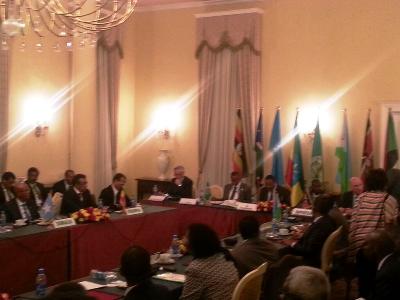IGAD tells South Sudan to suspend 28 states until review
January 31, 2016 (ADDIS ABABA) – The East African regional block, the Intergovernmental Authority on Development (IGAD), has urged President Salva Kiir and his government to “suspend” the implementation of the 28 states he created, saying the decision was “inconsistent” with the peace agreement signed by warring parties in August 2015.

The statement said IGAD is concerned by the decision of President Kiir’s government to implement the order.
“Concerned by the recent decision of the Government of South Sudan to implement the October 2, 2015 Presidential Decree on the creation of 28 new states, given that such action is insistent with the terms of ARCSS [Agreement on Resolution of Conflict in South Sudan,” partly reads the statement, dated 31 January, seen by Sudan Tribune on Sunday.
It called on the parties, the government, the armed opposition faction of the Sudan People’s Liberation Movement (SPLM-IO), and other partners in peace, to instead form a boundary commission with membership of all the parties to the peace agreement and review the process for creation of new states.
“Urges the Parties, subsequent to the formation of TGoNU at national level, in the absence of agreement on the creation of new states, to suspend further action implementing the operationalization of new states until an inclusive, participatory National Boundary Commission comprising all parties to ARCSS reviews proposed states and their boundaries, and that this review process occur, for a period of up to one month,” it said.
The statement further said in case the parties to the agreement will not agree on proposed states, they will revert to the provisions of the agreement which is based on 10 states.
“Indicates to the Parties that in the event there are outstanding disputes at the end of the boundary review process, the Parties should revert to the provisions of the Agreement.”
IGAD however urged the parties to amend the constitution by incorporating the peace agreement into the constitution, but added that the parties should form a transitional unity government, even if there is no constitution in place, using the peace agreement as the supreme document, at least at the national level.
It however emphasized that the two parties should first deploy their joint integrated forces in the capital, Juba, as the first phase in the implementation of the peace agreement before a transitional unity government can be formed, further urging the parties to deploy the forces in Juba in the first week of February.
“Calls on the Parties to immediately implement, by no later than the first week of February 2016, the first phase of the Transitional Security Arrangements for Juba in order to provide for the establishment, without further delay, of the TGoNU,” says the communiqué.
The statement by IGAD, which mediated the peace talks for two years resulting to the peace agreement, implies that once joint forces are deployed in the capital, the parties should form the government at the national level as the 28 states are suspended and boundary body of membership of all the parties review the process.
As the regional body seems to encourage dialogue on creation of more states, it also recommends reverting to the existing 10 states should there be no agreement among the parties on the new states to create.
The 55th extraordinary session of IGAD foreign ministers also discussed peace and security in Somalia.
(ST)
